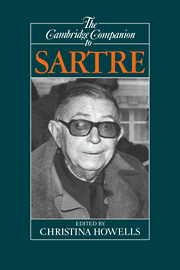Book contents
- Frontmatter
- Introduction
- Part I Phenomenology and existentialism
- 1 Sartre's ontology: The revealing and making of being
- 2 Role-playing; Sartre's transformation of Husserl's phenomenology
- 3 Individuality in Sartre's philosophy
- Part II Psychology and ethics
- Part III History and structure
- Conclusion: Sartre and the deconstruction of the subject
- Appendix; Hegel and Sartre
- Bibliography
- Index
2 - Role-playing; Sartre's transformation of Husserl's phenomenology
from Part I - Phenomenology and existentialism
Published online by Cambridge University Press: 28 May 2006
- Frontmatter
- Introduction
- Part I Phenomenology and existentialism
- 1 Sartre's ontology: The revealing and making of being
- 2 Role-playing; Sartre's transformation of Husserl's phenomenology
- 3 Individuality in Sartre's philosophy
- Part II Psychology and ethics
- Part III History and structure
- Conclusion: Sartre and the deconstruction of the subject
- Appendix; Hegel and Sartre
- Bibliography
- Index
Summary
INTENTIONAL ANALYSIS
The title of one of Sartre's essays, Questions of Method, is perhaps a sufficient reminder of how remote from us he was as a philosopher. Questions of methodology, Charles Taylor long ago pointed out, are “usually thought to be a waste of time” in England, where most philosophers prefer to adopt “the stance of the inarticulate gardener with a green thumb being interrogated by the agronomist - I just plants it and it grows.” Sartre takes over from Husserl's phenomenology two methodological procedures, “intentional analysis” and “eidetic analysis.” Intentional analysis is a procedure for analyzing consciousness with respect to its “meaning-endowing” acts, by which I identify something as being what it is. Thus I am conscious of it as “a triangle,” as “a table,” as “anger.”
Sartre takes over from Husserl's phenomenology two methodological procedures, "intentional analysis" and "eidetic analysis." Intentional analysis is a procedure for analyzing consciousness with respect to its "meaning-endowing" acts, by which I identify something as being what it is. Thus I am conscious of it as "a triangle," as "a table," as "anger." Phenomenological analysis is in-tentional in the etymological sense that it follows out the identifying reference of the "act" to the object "aimed at" as the "target" of the reference. Sartre's dedication to intentional reference is manifest in the succession of two titles: Having reviewed traditional theories of the imagination under the title L'Imagination, he conducts his own analysis under the title L'Imaginaire. The difference in title indicates a change from the traditional analysis in which the imagination is one of the faculties of the mind, to an intentional analysis in which characteristics of the imagination are determined by following out the reference to the imaginary object. I shall offer an example of this intentional analysis as soon as I have brought out how an intentional analysis is also "eidetic."
- Type
- Chapter
- Information
- The Cambridge Companion to Sartre , pp. 39 - 66Publisher: Cambridge University PressPrint publication year: 1992

